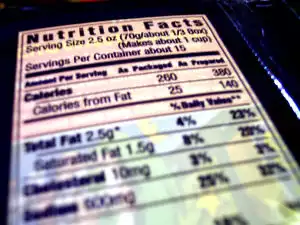Improving one’s diet is a goal that many people strive for, whether it be for weight loss, overall health, or a desire to feel better both physically and mentally.
However, with countless fad diets and conflicting information, it can be overwhelming and confusing to know where to start.
The truth is, making simple changes to your diet can have a significant impact on your overall well-being.
These changes don’t have to be drastic or restrictive, and they can be easily incorporated into your daily routine.
In this article, we will discuss 10 simple changes that you can make to improve your diet and support your health goals.
These changes have been recommended by nutritionists and health experts, and they are backed by scientific research.
By implementing even a few of these adjustments, you can make a positive and sustainable impact on your nutrition and overall health.
So, let’s dive in and discover how small changes in your diet can lead to big results.
Table of Contents to 10 Simple Changes to Improve Your Diet
Incorporate more whole foods daily
One effective change that can greatly improve your diet is to incorporate more whole foods into your daily meals.
Whole foods refer to unprocessed or minimally processed foods that are in their natural state, such as fruits, vegetables, whole grains, lean proteins, and nuts.
These foods are rich in essential nutrients, fiber, and antioxidants, and can provide numerous health benefits.
By replacing processed and packaged foods with whole foods, you can ensure that your body receives the necessary nutrients it needs to function optimally.
Additionally, whole foods are often lower in added sugars, unhealthy fats, and artificial ingredients, making them a healthier option for maintaining a balanced diet.
Try incorporating a variety of whole foods into your meals and snacks, such as adding fresh berries to your breakfast, including a side of steamed vegetables with your lunch, or substituting refined grains with whole grains in your dinner recipes.
Trust me, these simple changes can make a significant difference in improving your overall health and well-being.
Limit processed and packaged foods
Another important change to consider in order to improve your diet is to limit the consumption of processed and packaged foods.
These types of foods are often high in added sugars, unhealthy fats, and sodium, which can have negative effects on your health.
Instead, focus on choosing whole, unprocessed foods that are closer to their natural state.
This includes fresh fruits and vegetables, lean proteins, whole grains, and nuts.
By making this switch, you can reduce your intake of artificial ingredients and preservatives, and ensure that you are nourishing your body with nutrient-dense foods.
Start by reading food labels and opting for products with minimal ingredients and no artificial additives.
Additionally, preparing your own meals at home using fresh ingredients can help you take control of what goes into your body and make healthier choices.
Small changes like these can have a big impact on your overall health and well-being.
Increase intake of leafy greens
One simple yet effective change you can make to improve your diet is to increase your intake of leafy greens.
Leafy greens, such as spinach, kale, and Swiss chard, are packed with essential vitamins, minerals, and fiber that can benefit your overall health.
Incorporating more of these nutrient-rich greens into your meals can provide numerous benefits, including improved digestion, enhanced immune function, and increased energy levels.
You can easily add leafy greens to your diet by including them in salads, stir-fries, smoothies, or as a side dish.
Experiment with different varieties to discover your favorites and try to include them in your meals on a regular basis.
By prioritizing leafy greens, you are nourishing your body with vital nutrients and taking a step towards a healthier lifestyle.
Choose lean protein sources
Opting for lean protein sources is another simple change you can make to enhance your diet.
Lean proteins, such as skinless poultry, fish, tofu, and legumes, provide essential amino acids while being lower in saturated fats.
These proteins are not only beneficial for muscle growth and repair but also help keep you feeling fuller for longer, supporting healthy weight management.
Incorporate lean protein sources into your meals by grilling chicken breast, baking fish fillets, or adding beans to soups and salads.
Choosing these lean options over higher-fat alternatives can contribute to a balanced and nutritious diet, helping you achieve your health goals.
Swap sugary drinks for water
A key step towards improving your diet is to replace sugary drinks with water.
While it may be tempting to reach for a soda or sugary juice, these beverages are often high in calories and added sugars, contributing to weight gain and an increased risk of chronic diseases.
By opting for water as your go-to beverage, you can hydrate your body without adding unnecessary calories or sugars.
Water also helps flush out toxins, supports digestion, and promotes overall well-being.
To make this switch easier, keep a reusable water bottle with you throughout the day, and consider infusing it with refreshing fruits or herbs for added flavor.
Prioritizing water over sugary drinks is a simple yet powerful change that can have a significant impact on your overall health and well-being.
Eat a variety of fruits
Incorporating a variety of fruits into your daily diet is another simple yet effective change to improve your overall nutrition.
Fruits are not only delicious, but they also offer a wide range of essential vitamins, minerals, and antioxidants that support good health.
Each fruit brings its own unique set of nutrients, so by diversifying your fruit selection, you can ensure you are getting a wide range of beneficial compounds.
From the vitamin C-rich citrus fruits to the potassium-packed bananas, the options are endless.
Whether you enjoy them as a snack, add them to your breakfast bowl, or blend them into a refreshing smoothie, incorporating a variety of fruits into your diet provides a natural and nutritious way to support your well-being.
Include healthy fats in meals
To further enhance your diet, it is important to include healthy fats in your meals.
While the word “fat” may often carry a negative connotation, not all fats are created equal.
In fact, incorporating sources of healthy fats into your meals can have numerous benefits for your overall health.
Healthy fats, such as those found in avocados, nuts, seeds, and olive oil, provide essential nutrients and offer a feeling of satiety, helping to keep you satisfied between meals.
Additionally, these fats play a crucial role in the absorption of fat-soluble vitamins, such as vitamins A, D, E, and K.
By including healthy fats in your meals, you can improve the nutrient profile of your diet and support optimal health and wellness.
Reduce sodium intake
One important aspect of improving your diet is to be mindful of your sodium intake.
While sodium is essential for our bodies to function properly, consuming excessive amounts can have negative effects on our health.
High sodium intake has been linked to increased blood pressure, which can increase the risk of heart disease and stroke.
To reduce your sodium intake, opt for fresh and whole foods instead of processed and packaged foods, as they tend to be high in sodium.
Additionally, flavor your meals with herbs, spices, and other seasonings instead of relying on salt for taste.
By making these simple changes, you can lower your sodium intake and promote better cardiovascular health.
Choose whole grain options
When it comes to improving your diet, opting for whole grain options is a smart choice.
Whole grains are a great source of fiber, vitamins, and minerals.
Unlike refined grains, such as white bread and white rice, whole grains retain their bran and germ, which contain valuable nutrients.
Incorporating whole grain options into your meals can help regulate blood sugar levels, promote digestive health, and contribute to a feeling of fullness, making it easier to maintain a healthy weight.
Look for products labeled as “100% whole grain” or check the ingredient list for whole grain flours or whole grains like oats, quinoa, or brown rice.
By choosing whole grain options, you can enhance the nutritional value of your meals and support your overall well-being.
Practice mindful eating habits
One simple change that can greatly improve your diet is practicing mindful eating habits.
Mindful eating involves paying close attention to the sensory experience of eating, including the taste, texture, and aroma of the food.
By slowing down and savoring each bite, you can better tune in to your body’s hunger and fullness cues, helping you avoid overeating.
Additionally, practicing mindfulness while eating can enhance your appreciation for food and promote a healthier relationship with eating.
To incorporate mindful eating into your routine, try to eliminate distractions such as screens or work while you eat, chew your food thoroughly, and take breaks between bites to check in with your hunger levels.
By making mindful eating a habit, you can foster a more balanced and enjoyable approach to nourishing your body.
In conclusion, incorporating these 10 simple changes into your daily diet can have a positive impact on your overall health and well-being.
By focusing on incorporating more whole foods, reducing processed and sugary foods, and making mindful choices, you can nourish your body and fuel it with the nutrients it needs to thrive.
Remember, small changes can lead to big results, so start implementing these changes today and see the difference it can make in your life.
Here’s to a healthier and happier you!
FAQ
What are some easy substitutions I can make in my diet to improve my overall health?
Some easy substitutions to improve your health include swapping white bread for whole grain bread, sugary drinks for water or herbal tea, regular potato chips for baked veggie chips, and processed snacks for fresh fruits or nuts.
Additionally, replacing creamy dressings with olive oil and vinegar, sugary cereals with oatmeal or whole grain cereal, and red meat with lean proteins like chicken or fish can also have a positive impact on your health.
These simple changes can help increase nutrient intake, reduce calorie and sugar consumption, and improve overall well-being.
How can I incorporate more fruits and vegetables into my daily meals?
You can incorporate more fruits and vegetables into your daily meals by meal prepping with pre-cut and washed produce, adding them to smoothies, salads, and stir-fries, using them as toppings on yogurt or oatmeal, swapping out processed snacks for fresh produce, and experimenting with new recipes that feature fruits and vegetables as main ingredients.
Additionally, setting a goal to consume a certain number of servings each day and keeping a variety of produce on hand can make it easier to reach your goal.
Are there any specific foods I should avoid or limit in order to improve my diet?
Limiting processed foods high in added sugars, unhealthy fats, and sodium is key to improving your diet.
Additionally, reducing intake of sugary beverages, fast food, fried foods, and excessive red meat can have a positive impact on your health.
Focus on incorporating more fruits, vegetables, whole grains, lean proteins, and healthy fats into your diet for optimal nutrition.
Moderation and balance are key in creating a healthy eating pattern.
How can I reduce my intake of added sugars and processed foods?
To reduce your intake of added sugars and processed foods, focus on consuming whole, unprocessed foods like fruits, vegetables, whole grains, lean proteins, and healthy fats.
Read food labels and choose items with minimal added sugars and ingredients you can recognize.
Cook at home more often to have control over what goes into your meals.
Swap sugary snacks for healthier options like nuts, seeds, or fresh fruit.
Gradually reduce your consumption of sugary drinks and opt for water or unsweetened beverages instead.
Be mindful of portion sizes and practice moderation when consuming processed foods.
What are some simple meal prep tips to help me stick to a healthier diet plan?
- Plan your meals in advance to avoid impulsive eating choices.
- Cook in bulk to have healthy options readily available throughout the week.
- Use portion control to manage calorie intake.
- Incorporate a variety of fruits, vegetables, lean proteins, and whole grains.
- Invest in quality storage containers to keep meals fresh.
- Pre-cut and wash produce to make cooking quicker and easier.
- Stay hydrated and avoid sugary beverages.
- Prepare snacks to prevent unhealthy snacking.
- Keep track of your progress and adjust as needed.
- Allow yourself some flexibility to enjoy occasional treats.







